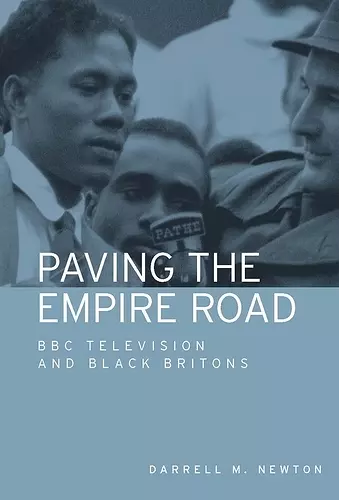Paving the Empire Road
BBC Television and Black Britons
Format:Paperback
Publisher:Manchester University Press
Published:7th Oct '19
Currently unavailable, and unfortunately no date known when it will be back

Beginning in the 1930s and moving into the post millennium, this book provides a historical analysis of the policies and practices established by the BBC as it attempted to assist white Britons in adjusting to the presence of African-Caribbeans. Among the themes the book explores are current representations of race, the future of British television and its impact on multi-ethnic audiences. The chapters include an extensive analysis of television programming, along with personal interviews that reveal the efforts of black Britons working for the BBC, whether as writers, producers or actors.
"Paving the Empire Road assembles Newton's considerable research at the BBC Written Archive Centre and his consultation of written documents including memoranda, letters and corresponding policy decisions, along with programme transcripts and synopses. Newton contributes a nuanced approach that foregrounds internal developments and issues at the BBC and links texts with context - an endeavour that is at its richest when mapping the early post-war years that coincided with postcolonial immigration."
Sarita Malik, Brunel University, Critical Studies in Television 9/1, 2014
'Newton's substantial scholarship deserves a wide audience. Paving the Empire Road ends provocatively, citing an unspecified report on the challenges the BBC faces regarding "a positive acceptance of cultural diversity" and offering an unanswered question: is this a problem of a few months, or a few decades, ago? The conclusion invokes "meaningful changes", while seeming sceptical of the gradual evolution it has explored: from the BBC's "somewhat noble" public encouragement of assimilation and tolerance, to investigation of its own diversity issues. "Before, we would just moan at the television", the actor Treva Etienne says, remarking on the evolving black consciousness of the power to transform media images. Faced with the complexity of the BBC's workings, no reader of Darrell Newton's study dare "just moan" about the slowness or the inevitability of change.'
Vahni Capildeo, TLS, 18 January 2013
'Newton draws together a wealth of information from the rich records of the BBC's Written Archives, material that will prove invaluable to researchers exploring television as such, as well as those primarily interested in the experiences of black people in it. Newton's book also provides a forum for prominent media professionals (many of whom he interviewed) to express their views about how black Britons can best ensure a more balanced presence in British television in the future.'
Anne Spry Rush, University of Maryland, American Historical Review, 13 August 2014
'...this academic study is an important contribution towards themapping and understanding of the history of black participation within Britishtelevision...His factual description manages to highlight how broadcasting choices with relation to race in the UK-not only BBC 1 and 2 but also ITV, Channel 4 and other networks-have generally reflected the problematic issues of assimilation and multiculturalism,which underlay British post-colonial society.'
Carla Mereu, University of Reading, Historical Journal of Film, Radio and Television, 2012
'Paving the Empire Road assembles Newton's considerable research at the BBC Written Archive Centre and his consultation of written documents including memoranda, letters and corresponding policy decisions, along with programme transcripts and synopses. Newton contributes a nuanced approach that foregrounds internal developments and issues at the BBC and links texts with context - an endeavour that is at its richest when mapping the early post-war years that coincided with postcolonial immigration.'
Sarita Malik, Brunel University, Critical Studies in Television 9.1
'Newton's Paving the Empire Road is best read as a series of discoveries about the BBC's communication with various ethnic associations and black activists through a series of experimental services, conferences and programming. Newton assembles a vast array of programming notes, transcripts of meetings and documented discussions that reveal that the BBC irregularly but consistently elicited the advice and suggestions of West Indian and South Asian community leaders. These findings are, simply put, archival gems.'
Brett Bebber, Old Dominion University, Journal of British Cinema and Television 13.1 (2016)
ISBN: 9781526143617
Dimensions: 234mm x 156mm x 15mm
Weight: 408g
288 pages